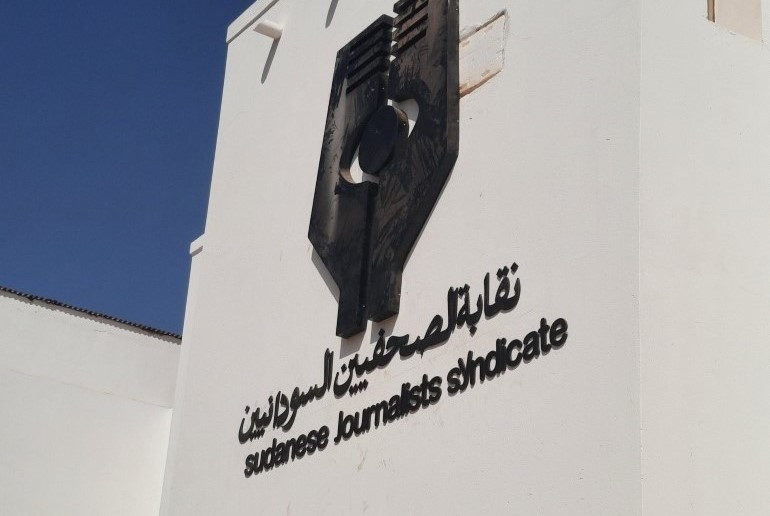Sudanese Journalists Syndicate: ‘Media targeted by both sides in Sudan war’

Sudanese Journalists Syndicate (Photo: Skyline International for Human Rights)
World Press Freedom Day, marked globally on May 3, this year coincided with the first anniversary of the start of the devastating war between the Sudanese Armed Forces (SAF) and the paramilitary Rapid Support Forces (RSF). Sudanese journalists are living in tragic situations, in light of the comprehensive collapse the country is witnessing.
Sudanese journalists were by no means an exception. They were harmed by the war, but they faced targeting of a different kind, related to their identity as journalists. They remained targeted by both sides of the conflict, unable to carry out their duty of providing journalistic coverage and reach the site of the event. Radio Dabanga reporters Omar Abdelaziz and Suleiman Siri speak to leading figures of the Sudanese Journalists Syndicate (SJS) as the war in Sudan wages on into its second year.
Targeted
The secretary general of the SJS, Mohamed Abdelaziz, said in an interview with Radio Dabanga yesterday that “If we go beyond the general threats facing the people from bombing, sniping and other measures, and the lack of medical and health services, Journalists are targeted by both sides of the conflict. Journalists, wherever they are in the conflict zones, are targeted because they may be a hostile or carry opinions or positions or convey facts that should not be conveyed.
“Journalists are targeted by both parties until their intentions and identity are confirmed, and to ensure that they transmit the propaganda message to the party whose area of control you are present in,” he explained.
“Your movement as a journalist cannot work clearly by taking pictures and even taking simple statements, etc., which could be a means of personal targeting that exposes you to investigation and interrogation. In fact, journalists are even unable to work normally in safe areas and outside the circle of conflict.”
He said that “since the war broke out, the media scene has become a stage for political and propaganda discourse for each party. “Independent media channels and newspapers went out of business, and coverage is now almost done by regional channels and international media.”
Journalists are subjected to clear and systematic targeting, he said and mentioned the killing of six journalists, including two incidents of systematic targeting, calling on the Sudanese authorities and the regional and international communities to investigate them and bring to trial the people who were involved in these violations, whether our colleague Halima Idris, who was working for Sudan Bukra, who was run over by a vehicle of a force affiliated with the RSF. Or my colleague Ahmed Arabi, the broadcaster on the Blue Nile Channel, who was killed in Omdurman by men wearing uniforms of the SAF.
Media blackout
Speaking to Radio Dabanga, the secretary general of the SJS considered that the systematic violations and targeting of journalists led to what is known as the issue of “media darkness”. He said that the areas witnessing clashes and violence led to a decrease in the number of journalists present there. This led to the absence of truth and the absence of objective coverage. The coverage contained therein is merely propaganda for one party against another party.
He saluted Sudanese journalists “wherever they are”, as they were steadfast in facing the various challenges on World Press Freedom Day. He said that his message to them was to adhere to professionalism, search for the truth, express the voices of the voiceless, be focused on the public, and reflect the great difficulties and challenges that they face and suffer under these difficult circumstances.
Global appeal
Member of the secretariat of the Sudanese Journalists Network, Khaled Ahmed, told Radio Dabanga that World Press Freedom Day is upon us in light of the very difficult humanitarian and security conditions that Sudanese journalists are suffering from.
“We at the Journalists Network call for launching a global appeal to all organizations interested in freedom of expression, freedom of the press, and peace-loving countries to work to protect Sudanese journalists.” In addition, the secretariat seeks to work from within the press community to create solidarity funds and urge publishers to pay financial compensation and social security and not leave them facing their fate alone.
The freedom official at the SJS, Eman Fadul expressed her deep sadness that World Press Freedom Day has passed, and Sudanese journalists are living in the worst conditions throughout the history of journalism.
“Since the beginning of the war on April 15, 2023, the media in all its forms has become a legitimate target for both sides of the conflict, and media institutions have left the labour market. She stated that 90 per cent of the media infrastructure was completely destroyed and looted. The journalists found themselves unemployed, and the number of unemployed people reached about a thousand male and female journalists, and they went to work in other professions.
On World Press Freedom Day 2024, Fadul considered there a complete absence of professional media and described this as an assassination of the truth, due to the absence of credible information and news, and accordingly, coverage adhering to the rules and ethics of the profession declined in favour of war media and misleading news.
She accused both sides of the conflict of monopolising information and broadcasting fabricated information subject to the war media machine, and saw that, accordingly, harmful speeches that were eating away at the social fabric, such as speeches of racism and hate, had spread.
Communications blackout
According to Fadul, the most common crime committed against the media and press freedoms in the year of war was the crime of cutting off communications and Internet networks, which she said deepened the complexities of journalistic work and exacerbated the processes of monitoring and documenting crimes and violations.
In the five states of Darfur, communications have been cut off for more than eight consecutive months, and 80 per cent of Sudan’s states remained completely out of coverage for more than four weeks in February and March.
“The blackouts and the weak internet connections impose more pressure on the people as they are deprived of the right to obtain information. We ourselves lost contact with several journalists for months and do not know the fate they face.”
Protection
The total number of documented violations committed against journalists reached 393 cases of direct violations against journalists and media outlets, according to the union’s report on the one-year anniversary of the war.
“Four men and two women journalists have been killed. Five men and the women reporters were subjected to physical assault and 39 journalists were detained, of whom three are still being held.
Fadul expressed her regret at the lack of response or application of international humanitarian law by both parties to the conflict, with regard to the physical and legal protection of journalists, calling for intensifying advocacy campaigns and providing psychological, moral and material support to journalists in conflict areas.
The syndicate’s freedoms officer called on the international community to exert more pressure on both sides of the conflict, especially in the aspect related to media classes, to enable journalists to carry out their journalistic duty without harassment or targeting in light of the situations of war and armed conflict.
Regarding providing support to journalists, she said that the syndicate works in the absence of a budget, allocated income, or resources, but it has networking with institutions and projects that it proposes to provide support to provide job opportunities and financial and legal protection.
The syndicate has planned and put forward support projects. “We are now waiting for partnerships to implement these projects together with the syndicate to benefit its members.”











 and then
and then